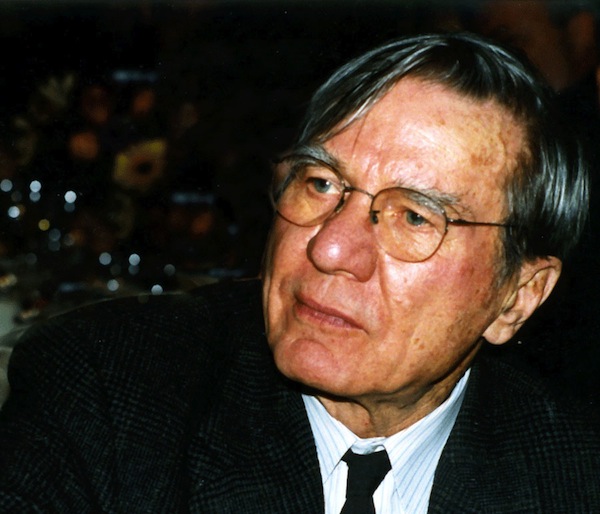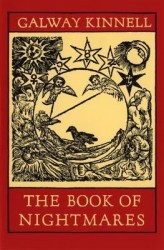Arts Remembrance: Galway Kinnell — “The Cadence of Vanishing”
Galway Kinnell served as the Poet Laureate of Vermont and penned a number of poems, which often took the form of pastoral ramblings, that celebrated his appreciation of the rural life.
By Robert Israel
Some years back I met Galway Kinnell as he strode across the field in Glover, Vermont, just down the road from his home in nearby Sheffield. He surveyed the crowd of revelers at Bread and Puppet Theatre’s Domestic Resurrection Circus with a broad smile. We chatted about our mutual roots growing up in Rhode Island, American poetry, and Walt Whitman in particular, all the while enjoying the bizarre goings-on in the field below us as young men and women — wearing paper mâché masks, burlap sacks and flowing ribbons — frolicked freely about a maypole.
Kinnell, who died October 28 at his home in Vermont at the age 87, was awarded the Pulitzer Prize for Poetry in 1983 and an American Book Award for his work. Born in Pawtucket, he decided early on to venture beyond the language of his region; he needed to turn to the work of Edgar Allan Poe and others to find an inspiration for his poetic sensibility.
“The accent of my hometown is rather unpoetical,” Kinnell once wrote. “It’s a very charming and loveable accent, but not very musical. To discover [in Poe] that this language could sing like that – ‘It was many and many a year ago in a kingdom by the sea…’ thrilled me.”
But it was the work of Walt Whitman – who broke from the confines of rhyme to write free verse – that influenced him the most. In this admiration he stands with other contemporary American poets, including Philip Levine, Donald Hall, Gerald Stern, Gary Snyder, and W.S. Merwin (who was his classmate at Princeton). He used a line from Whitman to title his eleventh collection of his poems, 2006’s Strong Is Your Hold (Houghton Mifflin). Whitman’s “Song of Myself” and other poems gave him the courage to draw from his experiences, to express his voice freely in long, flowing lines, and to describe what he saw and felt on a broad canvas.
“One thing that leads a person to poetry is an inner life of some activity and maybe even turbulence, the weight of meaning and feeling that has to get out,” Kinnell wrote. “There’s not a specific something that I’m aiming for, but there is something that’s almost unspeakable and poems are efforts to speak it bit by bit, like a burden that has to be laid down piece by piece, that can’t be just thrown off.”
Kinnell’s masterwork, The Book of Nightmares, appeared in 1971. It is a dark, book-length poem broken into chapters that takes the reader through the circles of Hell. Written in the first person, Whitmanesque in its corralling of details, the piece’s lyricism is not only harsh, but full of tenderness as well, especially toward the poet’s children, Maud and Fergus, to whom the volume is dedicated. Here are some choice lines:
I would blow the flame out of your silver cup,
I would suck the rot from your fingernail,
I would brush your sprouting hair of the dying light,
I would scrape the rust off your ivory bones,
I would help death escape through the little ribs of your body,
I would alchemize the ashes of your cradle back into wood,
I would let nothing of you go, ever,
until washerwomen
feel the clothes fall asleep in their hands,
and hens scratch their spell across hatchet blades,
and rats walk away from the cultures of the plague,
and iron twists weapons toward the true north,
and grease refuses to slide in the machinery of progress,
and men feel as free on earth as fleas on the bodies of men,
and lovers no longer whisper to the presence beside them in the
dark, O corpse-to-be …
– “Little Sleep’s-Head Sprouting Hair in the Moonlight”
Kinnell, who taught for many years at New York University, also wrote a long requiem for those who died in the World Trade Center on 9/11 which was published in The New Yorker (and collected in Strong Is Your Hold). (He was politically active throughout his life, protesting the wars in Vietnam and Iraq and a fervent environmentalist.) He served as the Poet Laureate of Vermont and penned a number of lyrics, which often took the form of pastoral ramblings, that celebrated his appreciation of the rural life.
Perhaps the most fitting epitaph for Kinnell can be found in The Book of Nightmares. In “Little Sleep’s-Head Sprouting Hair in the Moonlight” he admonishes his daughter Maud to avoid sentiment and to experience life fully, to
learn to reach deeper
into the sorrows
to come – to touch
the almost imaginary bones
under the face, to hear under the laughter
the wind crying across the black stones. Kiss
the mouth
which tells you, here,
here is the world. This mouth. This laughter. These temple bones.
The still undanced cadence of vanishing.
Robert Israel writes about theater, travel and the arts, and is a member of Independent Reviewers of New England (IRNE). He can be reached at risrael_97@yahoo.com



[…] was selected to be Vermont State poet, an honor she shared with versfiers Robert Frost and Galway Kinnell), as positive: she said it got her writing her again. She had been wrestling with a form of […]
[…] and wrote about isolation and insanity), than with the two Vermont State Poets, the late Galway Kinnell (who lived in Sheffield), and this year’s Nobel Laureate, Louise Gluck, (who lived and […]